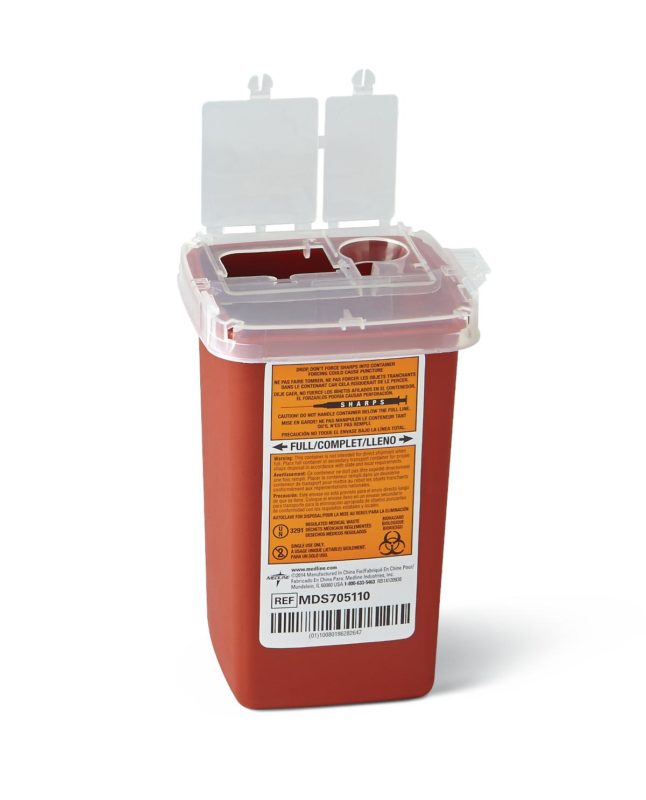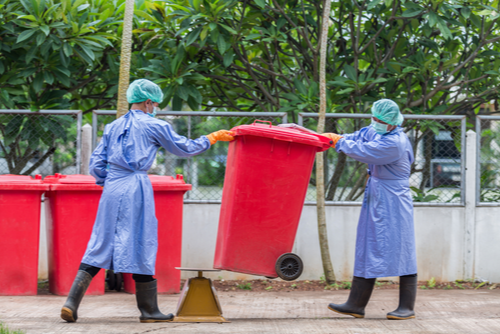Medical Waste Removal Proficiency: Where Service Excellence Fulfills Health Specifications
Medical Waste Removal Proficiency: Where Service Excellence Fulfills Health Specifications
Blog Article
Stay Compliant and Safe: Exactly How to Deal With Medical Waste Properly
In today's ever-changing health care landscape, making certain conformity and safety when it comes to medical waste disposal is of utmost importance. In this conversation, we will check out the different kinds of clinical waste, the affiliated risks, the legal demands, and the finest methods for maintaining a risk-free and compliant medical waste administration system.
Relevance of Correct Clinical Garbage Disposal
Proper medical waste disposal is of utmost relevance in ensuring the safety and wellness of both medical care employees and the basic public. Medical waste, which includes items such as used needles, contaminated dressings, and ended medications, positions significant health risks otherwise managed and disposed of appropriately.

Furthermore, incorrect disposal of clinical waste can result in ecological contamination. When clinical waste is not set apart, dealt with, or disposed of correctly, it can find its method right into landfills or bodies of water, potentially polluting the soil, air, or water resources. This can have damaging impacts on communities and human health, as unsafe materials might seep into the environment or be released right into the atmosphere.
Kinds Of Medical Waste and Their Threats
The varied array of clinical waste created by medical care facilities offers numerous dangers that must be meticulously resolved to guarantee appropriate disposal and stop potential damage to public wellness and the atmosphere. Clinical waste can be categorized right into different classifications based upon its characteristics and degree of risk.
One kind of medical waste is transmittable waste, that includes products that are infected with blood or various other possibly transmittable materials. This can include used needles, syringes, and various other sharp items, along with cells, swabs, and dressings from patients with infectious illness. Inappropriate disposal of infectious waste can cause the transmission of dangerous microorganisms and the spread of infections.
One more classification is unsafe waste, that includes materials that are hazardous, combustible, harsh, or reactive. This can consist of chemicals, drugs, and particular medical tools. Mishandling or incorrect disposal of hazardous waste can result in ecological contamination and position dangers to the health of waste workers and the public.
Contaminated waste is an additional type of clinical waste that have to be carefully handled. This waste includes products that include radioactive materials, such as utilized radiation therapy sources or infected research laboratory products. Inappropriate handling or disposal of contaminated waste can result in radiation exposure and serious wellness risks.
Finally, non-hazardous basic waste, such as paper, product packaging products, and food waste, is additionally produced by medical care centers. While this waste may not position substantial risks, it still needs to be correctly handled to maintain tidiness and prevent the destination of bugs.
To make sure the safe disposal of medical waste, healthcare facilities have to apply appropriate segregation, transport, treatment, and storage methods. This consists of making use of suitable containers, labeling, and training for staff, in addition to adhering to neighborhood regulations and standards. By dealing with the threats related to various sorts of medical waste, medical care centers can shield public health and the setting.
Regulative and lawful Demands for Disposal
In order to make sure the safe and appropriate disposal of medical waste, health care centers should follow legal and regulatory requirements. These demands remain in place to secure public health and wellness and the environment from the potential dangers connected with medical waste. Clinical waste is categorized as a special classification of waste as a result of its potential to send transmittable diseases and include hazardous compounds.

Some common needs include the partition and appropriate product packaging of medical waste, using authorized labels and containers, and the implementation of secure handling and transportation procedures - medical waste removal service. Healthcare centers might likewise be required to preserve documents of their waste management techniques and provide documents to regulatory authorities upon request
Failure to adhere to these governing and legal demands can lead to charges, fines, and reputational damages for health care centers. It is, as a result, necessary for healthcare suppliers to focus on compliance and develop durable waste administration procedures to make certain the safe and appropriate disposal of medical waste.
Ideal Practices for Safe Medical Waste Management
Medical care centers have to follow market finest techniques to guarantee the efficient and risk-free management of clinical waste - medical waste disposal services with WasteX. Carrying out these finest practices not only assists shield the atmosphere and public wellness yet additionally minimizes the threat of potential legal and financial consequences
One of the essential finest techniques is the correct partition and control of various kinds of medical waste. This includes utilizing color-coded containers and clearly identifying them to make certain that each kind of waste is gotten rid of properly. Furthermore, health care centers ought to have marked locations for storage space and disposal of clinical waste, with clear guidelines and treatments in area.
One more vital element of safe medical waste monitoring is the training and education and learning of healthcare team. All employees who deal with clinical waste should get detailed training on the appropriate handling, storage, and disposal procedures. It is crucial to make certain that personnel understand the possible threats connected browse around this site with clinical waste and are furnished with the needed expertise and abilities to manage it safely.
Regular surveillance and bookkeeping of waste administration practices is additionally essential. This entails consistently reviewing waste monitoring treatments, conducting inspections, and preserving accurate documents. By checking waste management practices, health care centers can identify any potential problems or locations for improvement and take corrective activities accordingly.
Lastly, health care facilities should focus on using eco-friendly disposal approaches whenever feasible. This includes making use of waste treatment technologies such as autoclaving or incineration, which can aid decrease the volume and hazardous nature of clinical waste.
Eco-Friendly Solutions for Medical Garbage Disposal
Implementing environmentally friendly remedies for clinical waste disposal is critical for health care centers to reduce ecological impact and guarantee sustainable methods. Typical methods of medical garbage disposal, such as incineration and landfilling, have been discovered to release harmful toxins into the air and infect soil and water resources. Consequently, there is an expanding need for alternative methods that are both environmentally friendly and safe.
One eco-friendly option is the implementation of on-site waste therapy systems. These systems make use of advanced technologies to safely process medical waste within the medical care center itself. By dealing with the waste on-site, transportation emissions and dangers connected with off-site disposal are reduced. In addition, these systems frequently use sophisticated sterilization strategies, such as vapor or microwave additional hints therapy, to make sure the complete damage of infectious microorganisms.
One more eco-friendly approach is the adoption of reusing programs for certain kinds of medical waste. Materials such as glass, plastics, and metals can be reused instead than disposed of in garbage dumps. By carrying out partition and reusing programs, medical care facilities can dramatically minimize their waste quantity and lessen their environmental impact.
In addition, healthcare centers can discover the use of reusable medical tools and supplies. By going with reusable things, instead of single-use alternatives, the amount of waste generated is substantially reduced. Recyclable items can be disinfected and utilized several times, leading to expense savings and less ecological effect.
Final Thought
In conclusion, proper disposal of clinical waste is crucial for keeping compliance and making sure safety. Complying with best practices for risk-free clinical waste monitoring and checking out eco-friendly solutions can contribute to a liable and lasting method to waste disposal in the medical care industry.
In this discussion, we will explore the numerous types of clinical waste, the affiliated risks, the legal requirements, and the finest methods for preserving a risk-free and compliant medical waste monitoring system - medical waste removal service.One type of clinical waste is infectious waste, which consists of items that are infected with blood or other possibly infectious products.Contaminated waste is another kind of clinical waste that must be meticulously handled. Clinical waste is classified as a special category of waste due to Recommended Reading its potential to transfer contagious illness and contain harmful substances
Following ideal practices for risk-free clinical waste administration and exploring green solutions can contribute to a lasting and liable strategy to lose disposal in the healthcare market. medical waste disposal services with WasteX.
Report this page